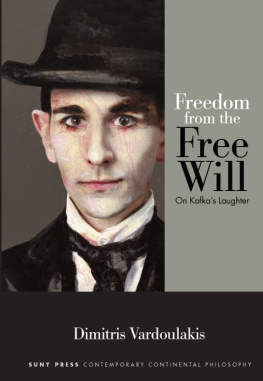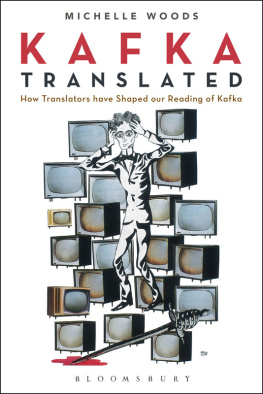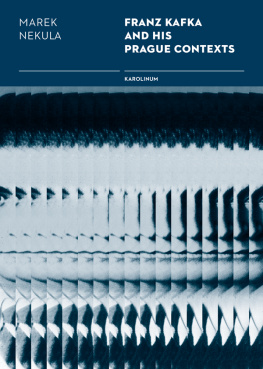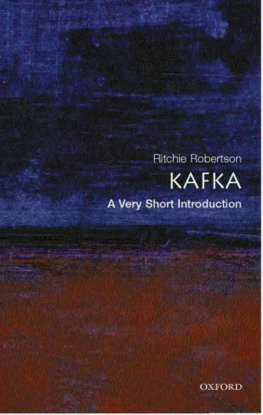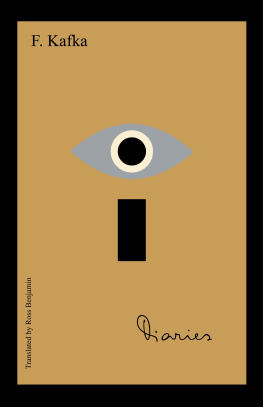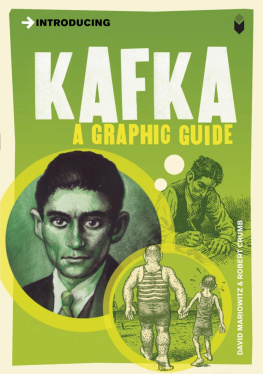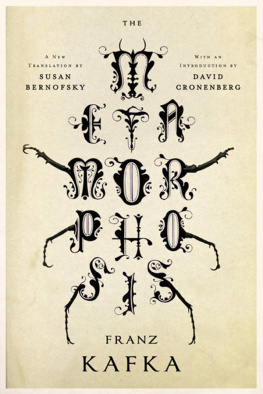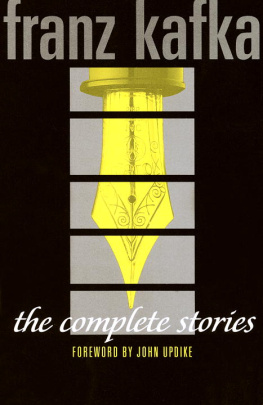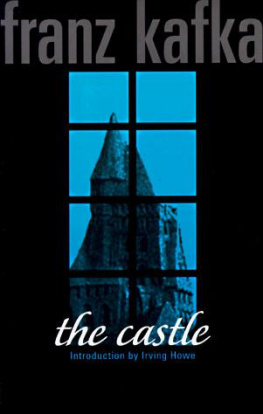Freedom from the Free Will
SUNY series in Contemporary Continental Philosophy
Dennis J. Schmidt, editor
Freedom from the Free Will
On Kafkas Laughter
DIMITRIS VARDOULAKIS
Cover art by Lita Cabellut / Franz Kafka / 280 200 cm / mixed media on canvas
Portrait of Human Knowledge 2012 / Photography: Studio Tromp
Published by State University of New York Press, Albany
2016 State University of New York
All rights reserved
Printed in the United States of America
No part of this book may be used or reproduced in any manner whatsoever without written permission. No part of this book may be stored in a retrieval system or transmitted in any form or by any means including electronic, electrostatic, magnetic tape, mechanical, photocopying, recording, or otherwise without the prior permission in writing of the publisher.
For information, contact State University of New York Press, Albany, NY
www.sunypress.edu
Production, Diane Ganeles
Marketing, Fran Keneston
Library of Congress Cataloging-in-Publication Data
Names: Vardoulakis, Dimitris, author.
Title: Freedom from the free will : on Kafkas laughter / Dimitris Vardoulakis.
Description: Albany : State University of New York Press, 2016. | Series: SUNY series in contemporary continental philosophy | Includes bibliographical references and index.
Identifiers: LCCN 2016005982 | ISBN 9781438462394 (hardcover : alk. paper) | ISBN 9781438462417 (ebook)
Subjects: LCSH: Kafka, Franz, 18831924Criticism and interpretation. | Kafka, Franz, 18831924Humor. | Liberty in literature. | Free will and determinism in literature.
Classification: LCC PT2621.A26 Z957 2016 | DDC 833/.912dc23
LC record available at https://lccn.loc.gov/2016005982
10 9 8 7 6 5 4 3 2 1
For Luks
Contents
Acknowledgments
There are several people to thank for accompanying me in the writing of this book. There are, first, my students at the Western Sydney University, where I have taught the material contained in this book three times, in 2009, 2011, and 2014. I would particularly like to thank Norma Lam-Saw and Aleksandra Ilic for reading and commenting on . I was especially lucky to have excellent teaching assistants while delivering these courses. I single out here Chris Conti and Hal Ginges, who produced their own articles in response to the material taught in the course. Thanks also to Mridula Chakraborty, Helen Koukoutsis, and Simon Fleming.
I am in the enviable position of being surrounded by intellectually stimulating colleagues whom I regard at the same time as friends. For discussions, intellectual stimulation, and for being there, Id like to thank Diego Bubbio and Charles Barbour, John Hadley and Jess Whyte, Anthony Uhlmann and Peter Hutchings, Alex Ling and Sabrina Achilles, and Mark Kelly and Lorrain Sim.
Over the years, I organized two Sydney Seminars for the Arts and Philosophy on Kafka. I am grateful to the Library of New South Wales for hosting the seminar, and to ABC RN for broadcasts related to the seminars. The first was seminar 14, titled Kafkas Cages, which took place on July 3, 2009. The participants were Kiarina Kordela and Chris Fleming. The second was seminar 17, Kafka and Philosophy, which took place on February 9, 2012. The participants were Henry Sussman, Paul Alberts, and Chris Conti.
In addition, I have learned a lot from all the colleagues who collaborated on the volume Freedom and Confinement in Modernity: Kafkas Cages (New York: Palgrave, 2011). I am particularly indebted to Kiarina Kordela, my coeditor for this volume and the fiercest interlocutor I have had the fortune to encounter.
I am also indebted to various colleagues around the world. I cannot possibly mention everybody, but I would like to single out the following: Gregg Lambert and Carry Wolfe invited me to participate in a gathering of the Society for the Study of Biopolitical Futures in Turing in June 2014, which was the first occasion that I presented the argument of the book as a whole in front of an engaged and demanding audience. Gerhard Richter organized a presentation of the general argument of the book at Brown University on November 7, 2014, where I was fortunate to receive excellent feedback from a number of participants. And Miguel Vatter, Vanessa Lemm, and Paul Patton invited me to present another part of the manuscript in another gathering of the Society for the Study of Biopolitical Futures in Sydney in February 2015.
Several other colleagues need to be mentioned. A number of discussions with Peter Szendy at a critical moment in the writing of the book left an indelible mark. Laura Odello showed me that the book is not just about Kafka, but it can also extend to other fields. Carlo Salzani and Brendan Moran were critical partners in conversation for developing . Liesel Senn provided some much-needed and very competent research assistance at a late stage in the books composition, and Amrita Tarr compiled the index and assisted with the galleys.
Over the years, Andrew Benjamin and Stathis Gourgouris have becomein different but equally significant waysfriends with whom I test my thoughts. I will always be in debt to their intellectual rigor and commitment.
I need to make special mention of my publishers, and in particular Andrew Kenyon, editor at SUNY, who welcomed the book project to the Press and handled the various stages with care and competence. Dennis Schmidt showed unbridled enthusiasm for the book ever since I mentioned it to him as something he could consider for his book series, for which I am profoundly grateful. This was not the first time that I have enjoyed Dennys generosity, and it will not be the last, I am sure, since chance has brought it about that we subsequently became colleagues.
The idea of the book was born in conversation with Amanda Third. Her generosity of spirit is such that it is impossible to ever repay my debt. Our son, Luks, was born on September 23, 2011, on the ninety-ninth anniversary of the writing of Kafkas The Judgment. This felicitous numerology compels me to dedicate the book to him.
A Note on Referencing Kafkas Works
All references to Franz Kafkas works in German are to the Fischer Kritische Ausgabe, edited by Jrgen Born, Gerhard Neumann, Malcolm Pasley, and Jost Schillemeit. I will specify in the notes only the particular editors of the volume that I am discussing.
I generally provide the page reference to the German only when there is an intrinsic reason, such as when I have altered the published translations or if I want to draw attention to an expression in the original. In these cases, the German page number follows the English one, and they are separated by a slash.
In general, I avoid entering into a number of well-rehearsed philological debates in Kafka scholarship when they do not relate directly to the substance of my argument, by appealing either to general usage or by following the solution of the translation that I reference. For instance, to give an obvious example, I retain the title Amerika for Kafkas earliest novel, even though we now know that Kafkas working title was Der Verschollene, which Brod changed to Amerika. I retain the title Amerika because it is the most commonly used title for this work, and because it is the one used in the translation that I referencebut without thereby suggesting that it is the correct title to use, whatever correct may mean in this context. Overall, my principle is to avoid philological disputes unless they are directly relevant to the argument.

